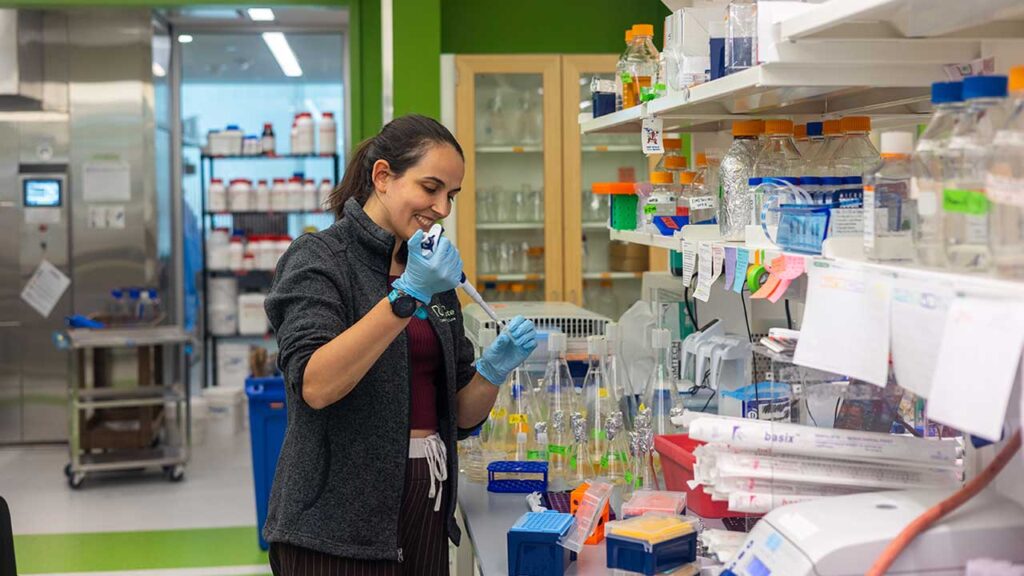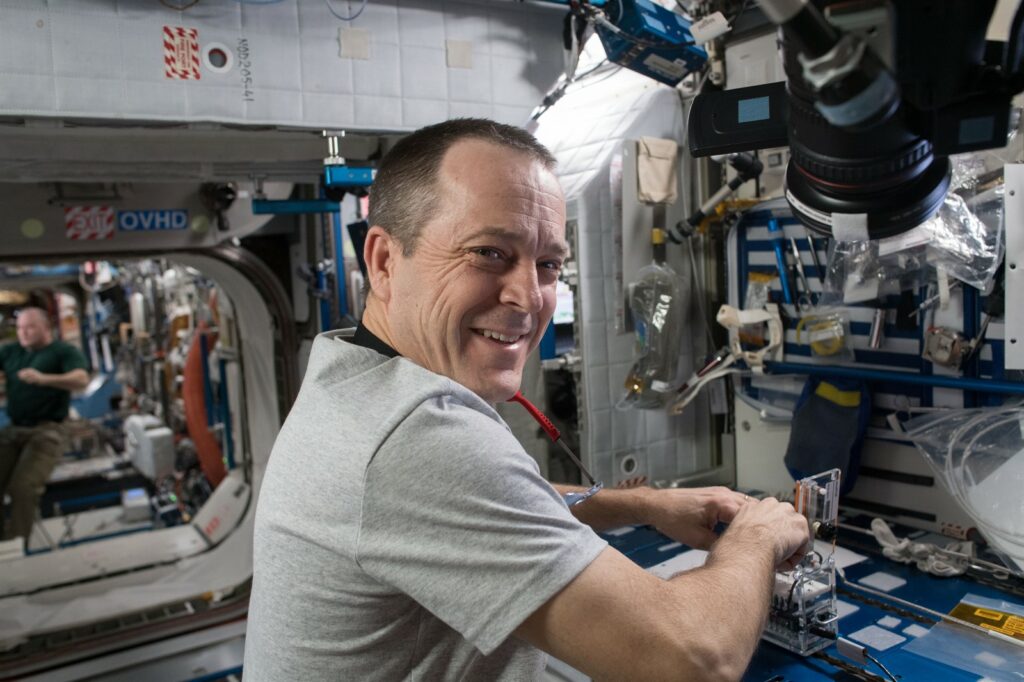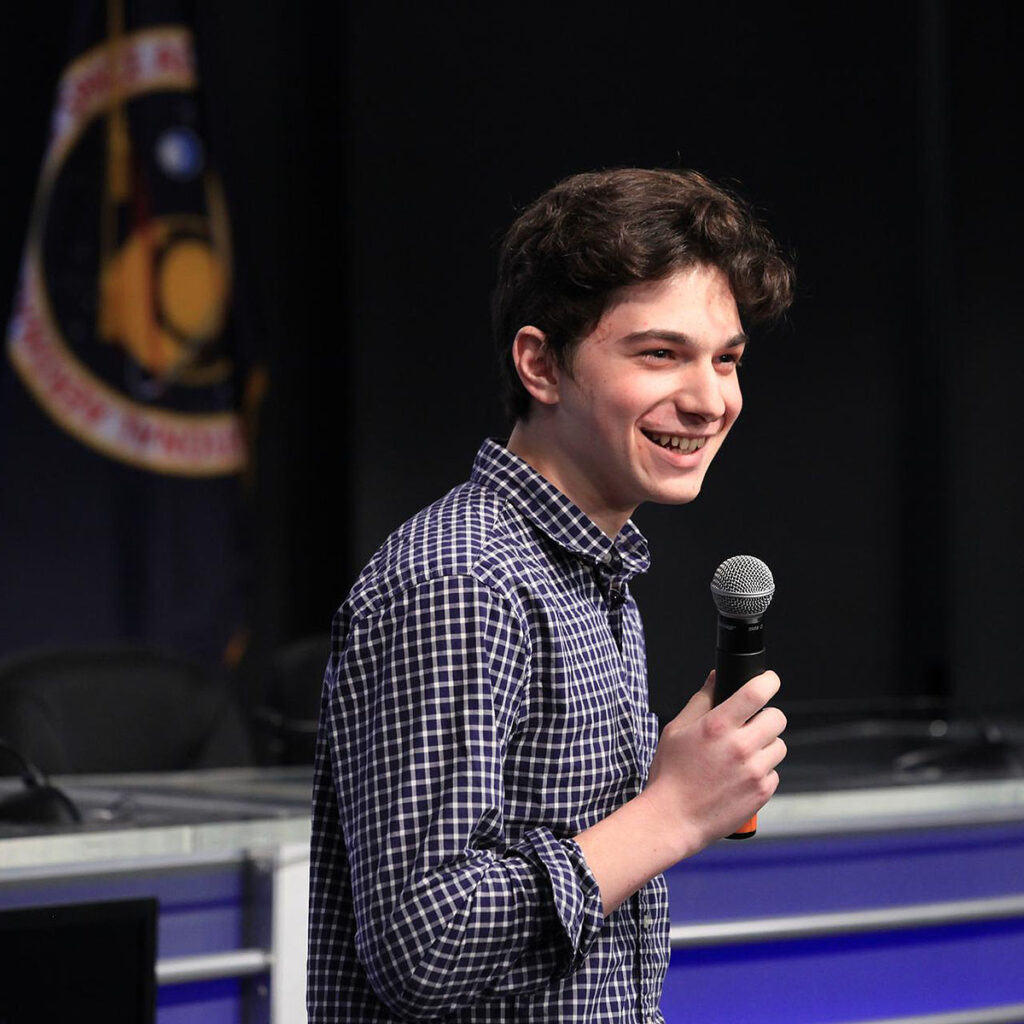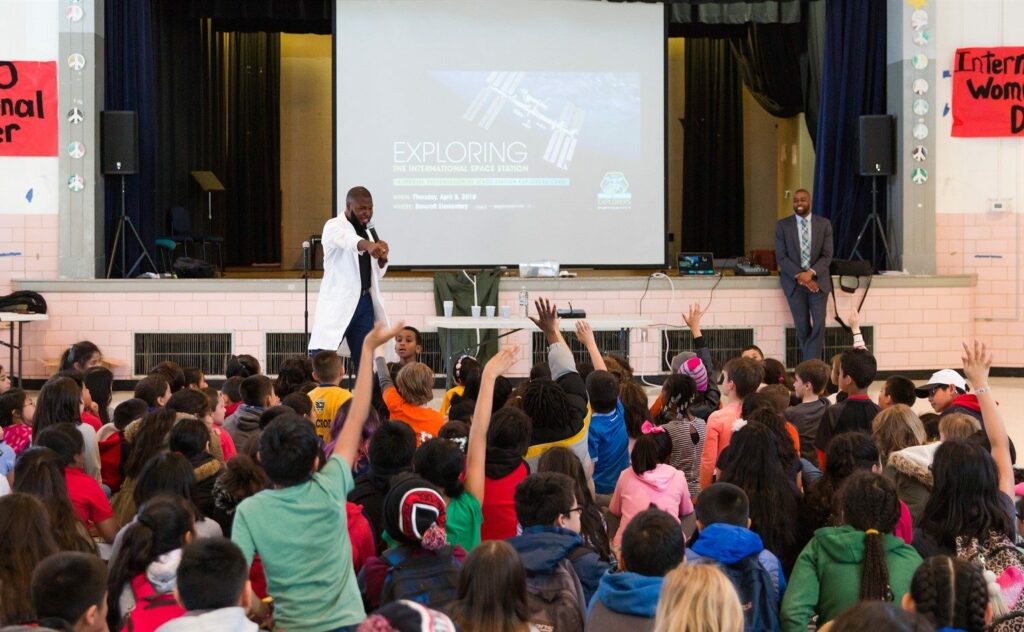Genes in Space Celebrates 10 Years of Student Innovation With New Investigation Currently on the Space Station

Aarthi Vijayakumar with teammates Michelle Sung, Rebecca Li, and David Li at Kennedy Space Center before their Genes in Space project launched in May 2023.
Media Credit: Genes in Space
The latest edition of Upward, the official magazine of the ISS National Lab, profiles the life-changing student program founded by Boeing and miniPCR
November 12, 2025
KENNEDY SPACE CENTER (FL), November 12, 2025 – International Space Station (ISSInternational Space Station) crew members wrapped up operations on a new student-led investigation through the Genes in Space™ program, which is celebrating its 10th anniversary this year. The project launched to the orbiting laboratory on SpaceX’s 33rd commercial resupply services mission(Abbreviation: CRS mission) A CRS mission is a cargo resupply mission contracted by NASA to deliver supplies and research to the International Space Station on commercial spacecraft as part of the CRS contract with three commercial companies. As part of CRS missions, experiments currently return to Earth on SpaceX Dragon spacecraft that splash down in the ocean. for NASANational Aeronautics and Space Administration and will return in the coming months for further analysis.
This latest experiment continues the legacy of Genes in SpaceAn annual national research competition for students in grades 7 through 12 to design pioneering biotechnology experiments that are conducted by astronauts on the space station. The program is funded by Boeing and miniPCR bio and supported by the ISS National Laboratory® and New England BioLabs. empowering students to conduct pioneering genetics research in space. The most recent edition of Upward, the official magazine for the ISS National Laboratory®, highlights the program and its influence on students. The article “From High School Labs to the ISS” showcases the transformative impact of Genes in Space on past participants, many of whom have gone on to careers in science, medicine, and entrepreneurship.
The investigation currently on the space station was developed by New York high school students Julia Gross and Isabelle Chuang, winners of the 2024 Genes in Space contest. The two are exploring the use of bacteriophages (viruses that attack bacteria) as therapeutic agents to combat microbial infections in space—a critical challenge for future long-duration missions, as the conditions of spaceflight can alter astronauts’ immune systems and enhance the virulence of microbes.
Genes in Space was founded in 2015 by Boeing and miniPCR bio, with support from the ISS National Lab and New England Biolabs. The program invites students in grades 7-12 to propose DNA-based experiments that leverage the unique environment of low Earth orbit(Abbreviation: LEO) The orbit around the Earth that extends up to an altitude of 2,000 km (1,200 miles) from Earth’s surface. The International Space Station’s orbit is in LEO, at an altitude of approximately 250 miles. to address real-world challenges in space biology. Over the last decade, the program has received more than 10,000 student proposals, and Genes in Space projects have led to nine peer-reviewed publications in science journals. Genes in Space winners have also supported multiple breakthroughs, including the first PCR and CRISPR experiments on the space station, and have uncovered insights into astronaut health, DNA repair, and immune system function.
“Genes in Space is more than a competition; it’s a launchpad for the next generation of space biologists,” said Scott Copeland, Boeing’s director for ISS research integration and Genes in Space co-founder. “We’re proud to celebrate a decade of student-led innovation that’s helping to shape the future of living and working in space.”
As the space station continues to serve as a platform for groundbreaking research, the Genes in Space program remains a beacon of inspiration, showing students that their ideas can truly reach the stars.
To learn more about advancements in space-based research and how they benefit people on Earth, visit our web page for Upward, the official magazine of the ISS National Lab.
Download a high-resolution image for this release: Students Ready for Launch at KSC
# # #
About the International Space Station (ISS) National Laboratory:
The International Space Station (ISS) is a one-of-a-kind laboratory that enables research and technology development not possible on Earth. As a public service enterprise, the ISS National Laboratory® allows researchers to leverage this multiuser facility to improve quality of life on Earth, mature space-based business models, advance science literacy in the future workforce, and expand a sustainable and scalable market in low Earth orbit. Through this orbiting national laboratory, research resources on the ISS are available to support non-NASA science, technology, and education initiatives from U.S. government agencies, academic institutions, and the private sector. The Center for the Advancement of Science in Space® (CASIS®) manages the ISS National Lab, under Cooperative AgreementA cooperative agreement is Federal assistance that establishes a relationship between the U.S. Government and a recipient in which the principal purpose of the relationship is to accomplish a public purpose of support or stimulation. Since 2011, the Center for the Advancement of Science in Space™ (CASIS™) has managed the National Laboratory® through a Cooperative Agreement with NASA. with NASA, facilitating access to its permanent microgravityThe condition of perceived weightlessness created when an object is in free fall, for example when an object is in orbital motion. Microgravity alters many observable phenomena within the physical and life sciences, allowing scientists to study things in ways not possible on Earth. The International Space Station provides access to a persistent microgravity environment. research environment, a powerful vantage point in low Earth orbit, and the extreme and varied conditions of space. To learn more about the ISS National Lab, visit our website.
As a 501(c)(3) nonprofit organization, CASIS(Abbreviation: CASIS™) The nonprofit organization that manages the ISS National Lab, which receives at least 50 percent of the U.S. research allocation on the International Space Station to facilitate research that benefits humanity (NASA manages the other 50% and focuses on research for space exploration purposes). accepts corporate and individual donations to help advance science in space for the benefit of humanity. For more information, visit our donations page.




